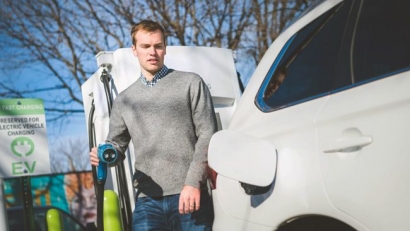
In its earlier order, the NCUC instructed Duke Energy to work with the Public Staff to organize a collaborative stakeholder process and then file any stakeholder-developed pilot programs.
“The move to an electric-driven transportation sector will include input from stakeholders from across North Carolina,” said Stephen De May, Duke Energy’s North Carolina president. “Our filing reflects the best ideas we heard on how Duke Energy can spur that transition.”
Although North Carolina has more than 26,000 electric vehicles in the state, Gov. Roy Cooper’s Executive Order 80 set forth a statewide goal of getting 80,000 zero-emission vehicles on the road by 2025.
Duke Energy’s efforts will lead to more than 1,000 charging ports being installed in the state.The company’s Phase II pilot programs will:
Separate from the Phase II filing, on April 30 the company filed for approval of a make-ready tariff that will provide credits to reduce the upfront cost of upgrading electrical systems to install charging infrastructure for homeowners and businesses.
“High upfront costs prevent our customers from unlocking the substantial benefits of EVs, and this challenge is especially prevalent for low- and moderate-income families,” said Lon Huber, Duke Energy’s vice president of rate design and strategic solutions. “These new programs remove a key financial barrier to adoption, enabling everyone to benefit from the expanded use of electric vehicles.”
Huber added that the collaborative stakeholder meetings in North Carolina will continue to review how the Phase II pilot programs are performing and to discuss innovative ways to expand the EV market, including additional rate designs and programs.
Supporting the transition to EVs
Duke Energy is a major supporter of electric vehicles. It has already launched ambitious programs to expand EV charging both internally at Duke Energy locations and externally through several utility pilot programs. An internal “Electrify by Example” initiative is starting with an effort to install workplace chargers at all work locations to enable employees to drive electric.
In Florida, the company's Park & Plug pilot has installed more than 590 EV public charging stations throughout the state. The deployment includes 50 fast-charging stations connecting areas of Florida previously underserved by EV fast-charging infrastructure. To date, drivers have used the Park & Plug network for more than 75,000 charging sessions, displacing more than 110,000 gallons of gasoline.
Regulatory action in 2020 led to pilot programs being approved in both North Carolina and South Carolina.If Duke Energy’s recent EV filings in North Carolina are approved, the company will build on its leadership with a comprehensive suite of EV programs, making it more affordable and convenient for customers to access EV charging infrastructure.
In South Carolina, the company will provide up to a total of $1,000 for 400 residential Duke Energy Carolinas customers who install a Level 2 charging station, provide access to their charging data, and manage EV charging load to occur during off-peak periods. The company will also deploy 60 fast chargers there to expand access to fast-charging infrastructure in the state.

